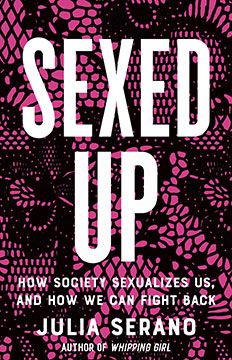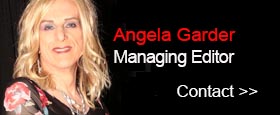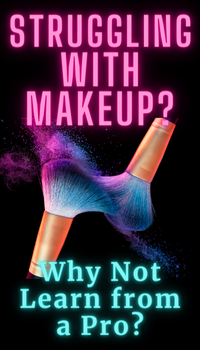Tell Shelley Anne: An Interview With Julia Serano
Julia Serano is an Oakland, California-based writer, performer, biologist, and activist. She is the author of several books, including Whipping Girl: A Transsexual Woman on Sexism and the Scapegoating of Femininity. Her latest book Sexed Up: How Society Sexualizes Us, and How We Can Fight Back, has just been released. Serano’s other writings have appeared in over 20 anthologies, and in media outlets such as The New York Times, The Guardian, TIME, Salon, The Daily Beast, AlterNet, Out, and Ms. Her life experiences as a trans woman, and her understanding of biology (she has a PhD in biochemistry and molecular biophysics from Columbia University and spent 17 years as a researcher at UC Berkeley in the fields of genetics and developmental biology), gives her a unique perspective on gender and sexuality, and her writings have been used as teaching materials in colleges across North America.
Serano, as you can tell from her biography, is an accomplished writer and trans advocate. I am grateful for her taking time from her busy and hectic schedule to meet the publishing deadline for this interview. As a published writer, she certainly understands deadlines.
TGForum: Share a little about your new book, Sexed Up.
 Ms. Serano: Sexed Up is about the many unconscious biases that shape how we view sex, gender, and sexuality. Some of it is about how we categorize people according to gender, and the many assumptions, expectations, and double standards that we subject people to once we have made that determination. But most of the book is focused on sexualization—our tendency to project sexual motives and meanings onto some groups of people but not others.
Ms. Serano: Sexed Up is about the many unconscious biases that shape how we view sex, gender, and sexuality. Some of it is about how we categorize people according to gender, and the many assumptions, expectations, and double standards that we subject people to once we have made that determination. But most of the book is focused on sexualization—our tendency to project sexual motives and meanings onto some groups of people but not others.
Most people are familiar with the ways in which women are often sexualized in our male-centric culture, which I discuss at length. But other marginalized groups are also sexualized, including trans people. Upon finding out that I am a trans woman, some people have stereotyped me as sexually deviant, or predatory, or promiscuous, or desperate, or exotic, or as a fetish object. In the book, I examine why this happens and what we can do to challenge it. Unlike more sex-negative books on the subject, my goal is to foster sexual equity without sacrificing sexual diversity in the process.
More info about the book—including reviews, excerpts, interviews, and links to purchase it online—can be found on the Sexed Up website. If your local bookstore or library does not have it, you can ask them to order it for you.
TGForum: Your new book touches on many negative norms facing society. What did your research entail and uncover? Anything new?
 Ms. Serano: The book was informed by my own personal experiences having been viewed as both male and female, and straight and queer, at different points of my life, and the many double standards I have faced with regards to that. But in the years since, I have also had a lot of conversations, and did a lot of reading and research into how various other marginalized groups have been sexualized. I chronicle all that in Sexed Up. While past writers tend to discuss these various forms of sexualization in isolation, I argue that they are all interconnected through sexual stigma.
Ms. Serano: The book was informed by my own personal experiences having been viewed as both male and female, and straight and queer, at different points of my life, and the many double standards I have faced with regards to that. But in the years since, I have also had a lot of conversations, and did a lot of reading and research into how various other marginalized groups have been sexualized. I chronicle all that in Sexed Up. While past writers tend to discuss these various forms of sexualization in isolation, I argue that they are all interconnected through sexual stigma.
Most of us are familiar with stigma as a synonym for shame. It most certainly can be experienced that way. But there is a lot of social and psychological research demonstrating that people view stigma as a contagion that can contaminate other people. So, if you interact or are intimate with members of stigmatized groups, people may imagine that you have been permanently corrupted by those encounters. In the book, I show how this unconscious pattern of thinking explains mainstream attitudes toward sex (such as the notion that women are spoiled by the act) and drives the assumption that LGBTQ+ people have the ability to turn other people queer and to corrupt children (as seen in recent groomer accusations).
TGForum: You have written many books and your writing has appeared in numerous publications. What topics stand out the most?
 Ms. Serano: I have written about a lot of topics (a comprehensive bibliography can be found here), but there are three subjects that I have spent the most time focusing on. The first is trans feminism and the issue of transmisogyny—that is, how sexism particularly targets trans female and feminine people. Both these issues involve challenging the pervasive negative sentiments toward femininity in our culture, as I discuss throughout my first book, Whipping Girl.
Ms. Serano: I have written about a lot of topics (a comprehensive bibliography can be found here), but there are three subjects that I have spent the most time focusing on. The first is trans feminism and the issue of transmisogyny—that is, how sexism particularly targets trans female and feminine people. Both these issues involve challenging the pervasive negative sentiments toward femininity in our culture, as I discuss throughout my first book, Whipping Girl.
Second, because of my academic training in science (and specifically biology), I have critiqued many faulty theories about biological sex and why some of us become transgender—this includes older theories like autogynephilia, as well as newer ones like social contagion and rapid onset gender dysphoria. The implicit purpose of these theories is to limit gender affirmative care through conversion therapies and/or strict gatekeeping, so I have written about those practices as well.
The third subject I have focused on is social justice activism and how to make it more inclusive—this was the subject of my second book Excluded, and I plan to write about that more over the coming year.
TGForum: At what point in your life did you decide to make a personal lifestyle change?
Ms. Serano: If you are talking about coming out and transitioning, I did that during 2000-2001. But I made an earlier important decision in early 1994, when I was 26. At the time, I was fully closeted, but I realized that I could not go on without letting the female and feminine side of me, as I thought of it back then, out on some occasions. That is when I first sought out the trans community and began exploring my gender in public and in interpersonal settings. I describe this period of my life in more depth in Chapter 17 of Whipping Girl. Long story short, that period helped me to demystify what it means to be trans and to be a woman, which helped me to realize that I could transition remaining myself.
 TGForum: In what direction, in your opinion, is the feminist and queer movement headed?
TGForum: In what direction, in your opinion, is the feminist and queer movement headed?
Ms. Serano: This is a difficult question to answer because there are various strands of feminism and numerous LGBTQ+ subcultures. While anti-trans feminists (often called “TERFs” or gender critical) are especially vocal, most people who are actively involved in feminism these days are trans-inclusive. Having said that, I do worry about the impact that these explicitly anti-trans feminists might have on younger generations who are not aware that there are other feminist perspectives on sexism and trans people.
With regards to the queer movement, it seems like we are always cycling between periods where respectability politics and striving for acceptance dominate, and periods of backlash where there is open mainstream hostility toward us and where we need to actively fight back. For much of the 2010s, we were mostly in the former situation. But now, with all the anti-LGBTQ+ legislation and groomer accusations, we have no choice but to push back on those efforts and champion alternatives to straight mainstream culture.
TGForum: As an activist, you must have a heavy involvement with the political environment.
Ms. Serano: A little bit. Throughout the 2000s and early 2010s, mainstream politics was not especially interested in trans people and issues. Therefore, a lot of my writing and activism back then was focused on winning over potential allies within LGBTQ+ communities, feminism, and other social justice movements. Obviously, there were some trans activists engaging in politics during that time, such as promoting non-discrimination laws and policies, but they typically had legal or political expertise that I did not have.
But since the late 2010s, I have increasingly written about the current anti-trans political backlash, especially gender critical feminism, disinformation about gender-affirmative healthcare, and the sexualization of trans people (as sexual predators or groomers)—these are all subjects that I do have prior knowledge and insights about. Hopefully that work has played a small role in changing people’s minds about trans perspectives and issues.
TGForum: Have you considered running for political office?
Ms. Serano: No, I have not. Mostly for two reasons. First, I think what I am best at is thinking through complex problems (such as gender, sexuality, and social justice) and offering nuanced analyses and potential solutions. Being a politician typically involves immediate reactions to situations and distilling complex ideas down to a more simplistic form. While I understand the necessity of doing that sometimes, I am not sure that I am particularly well-suited for it. The second reason is that I live in the San Francisco Bay Area, where all the existing politicians are quite liberal or progressive, and where trans/LGBTQ+/women’s rights are not being legislated against. Given this, I feel that I can be more impactful as a writer.
TGForum: On another personal note, I understand you are an accomplished musician and were part of the indie rock trio Bitesize. How much are you performing today?
Ms. Serano: While Bitesize is no longer active (as we all live in different cities now), I currently perform music under the name soft vowel sounds. It is a solo indie-rock/noise-pop music project. I released a four-song record in 2014 and played many live shows, especially in 2018 and 2019. My last live show was in Feb. 2020, just before we all went into Covid lockdown. I have taken a break from music since then, as I have been busy writing and promoting Sexed Up. But my goal for 2023 is to start performing again and to finally record the next soft vowel sounds record.
Like to make a comment or suggest an interview subject? Login here and use the comment area below.
Category: Interview











